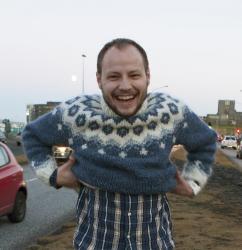In this series, I illuminate the individual poems of the Edda—that most famous, epic masterpiece of Icelandic literary tradition—with humour, vulgarity and modern realness. Are you reading this and thinking, “what the fuck is the Edda?” If so, you should start by reading my first recap of the Edda, chock-full of helpful context and shameless attitude. Or you can just shut up and read on.
The Rígsþula tells the story of Old Norse eugenics, so it’s obviously a bit fucked up.
I know, I know, the Rígsþula was written like 1000+ years ago when our contemporary concepts of racism and classism didn’t exist, so we can’t necessarily call it out like we would a celebrity’s long-forgotten racist tweet from 2008. Let’s just say that this should definitely make you slightly uncomfortable, but hopefully you can squeeze a chuckle out of that discomfort too.
Three’s company
The god Heimdallur goes for a walk along the sea. Eventually he comes to the house of a Great-grandmother and Great-grandfather, and after introducing himself as Rígur, they invite him to dinner. When their dinner is over and they go to bed, Rígur “sleeps” between them. I would’ve pegged Rígur for a power bottom, honestly, but the Rígsþula is very clear about his preference for the middle!
Nine months later the Great-grandmother has a baby, which sounds very unhealthy but okay, sure. The baby is described as black, ugly, and malformed so they name him Slave. He grows up to doing physical labour and eventually meets a girl basically named Slavette. They have a hoard of babies with names like Fighty, Smelly, Fatty, Slutty, Blacky, Fatleggy, Bignose, Slaveling and more! And thus, according to the Old Norse belief system, all the slaves and black folks of the world were created. I’ll just leave that there.
Orange is the new black
Rígur comes to another house. (See where this is going?) This one is owned by Grandmother and Grandfather. They eat dinner and do the thing in the bed with Rígur the way he likes it. When Grandmother gives birth to a little ginger boy, they name him Farmer. He grows up to marry a girl named Daughter-in-Law and they have jolly little babies such as Manly, Neighbour, Blacksmith, Lassy, Missy, Pretty, and so on, in their working-class mediocrity.
Ultimately, he comes to the fancy home owned by Mother and Father, who are well-dressed and (the poem is clear about this) very, very white. They have a spit roast for dinner and then they spit roast Rígur for dessert. Later, Mother has a little blond boy named Lord. Rígur actually comes back one day to instruct him to seize property, so Lord sets off to kill and maim his way to the top of the aristocracy. He marries a girl named Lively and they have kids named Noble, Heir, Inheritor, and eventually the youngest: King. And thus began the system of white supremacy and capitalistic exploitation in which we still live today! Amen.
Moral of the Rígsþula:
1. Do I really have to explain this?
2. Racism is bad
3. Threesomes are great, but use contraception. Obviously.
Read more Saga and Edda Recaps like that of the Rígsþula here. Buy Grayson’s “The Sagas And Shit” book—all the TL;DR Icelandic sagas crudely abridged for your amusement—here.
Buy subscriptions, t-shirts and more from our shop right here!


















